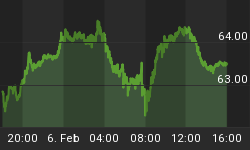As our phony economy begins to unravel before our eyes, it is amazing how few people can actually see it. The collective wisdom of stock market pundits, economists, and Federal Reserve officials gives the impression that everything is just fine. Although some acknowledge that housing is slowing down a bit, that there are isolated problems with subprime mortgages, and that inflation is not moderating as quickly as they hoped it would (let's ignore surging oil prices), few can see any grave threats to continued economic expansion, or the bull market in stocks, bonds or real estate.
Earlier this week a CNBC anchor asked a guest if the "economic baton" might now pass from housing to the consumer, much the same way it previously passed from the stock market to housing. I'm not exactly sure where the anchor believes that consumers will now be getting the money to lead us out of the economic morass. With adjustable rate mortgages now re-setting higher, home equity disappearing, credit card debt mounting, personal savings at record lows, and the cost of basic necessities continuing to rise, the consumer is all tapped out. In fact, consumer spending is not just going to slow down; it is going to fall off the edge of a cliff.
With more traditional mortgage lending standards beginning to return, traditional home prices can not be too far off. And for those who may not have noticed, median home prices are still way above traditional levels as determined by yardsticks such as affordability and rent vs. own analysis. In many markets, normal levels may only be half of their current "appraised" values. However, due to the glut of homes that will ultimately hit the market, and the absence of qualified or willing buyers, home prices, at least in the short term, may fall well below normal levels.
Even when reporting on the subprime mess and the move to raise lending standards, most in the media still get it wrong. They seem to think the emerging "credit crunch" is a problem for home buyers as it makes qualifying for a mortgage that much more difficult. But, by preventing buyers from overpaying for homes, the credit crunch is actually a blessing in disguise. Tighter lending standards will help precipitate a crash in real estate prices. What could be better for potential home buyers than cheap houses? Sure they might have to wait a few more years until they can actually save enough money for a down payment, but since the purchase prices will be so much lower, those down payments will be easier to accumulate. More importantly, since they will be borrowing so much less money, the total cost of buying will be reduced even more substantially. The one caveat of course is that many such individuals might find themselves unemployed for a while, as the housing collapse ushers in a prolonged and severe recession. I guess you can't have everything!
The real problems will be for existing homeowners, especially those who overpaid, who are unable to sell for their loan amounts, and who lack sufficient home equity or incomes to refinance their adjustable rate mortgages. Also feeling the pinch will be mortgage lenders, who will be unable to recoup their investments when borrowers default. Of course, the ultimate bag holders will be American taxpayers. As the crisis widens, politicians will inevitably seek to bail out everyone in danger of losing money on real estate purchased in the boom years. This will result in huge run-ups of the Federal deficit, which will be financed by inflationary monetary and fiscal policies. As a result, the biggest losses could be reserved for savers, retirees, investors, or anyone left holding dollar-denominated financial assets when the music finally stops playing.
For a more in depth analysis of the U.S. economy and why it is in so much trouble, read my new book "Crash Proof: How to Profit from the Coming Economic Collapse." Click here to order a copy today.
More importantly make sure to protect your wealth and preserve your purchasing power before it's too late. Discover the best way to buy gold at www.goldyoucanfold.com, download my free research report on the powerful case for investing in foreign equities available at www.researchreportone.com, and subscribe to my free, on-line investment newsletter at http://www.europac.net/newsletter/newsletter.asp.















